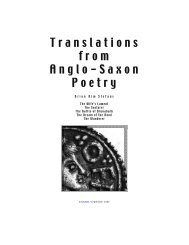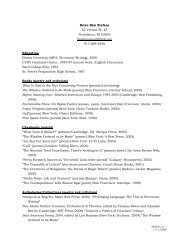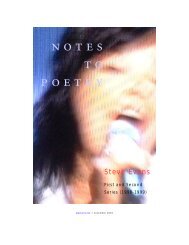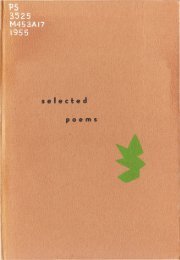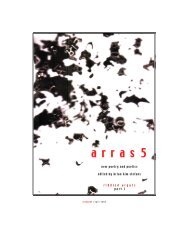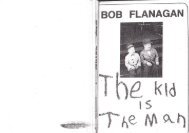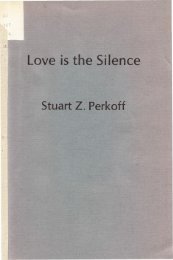new poetry and poetics edited by brian kim stefans - Arras.net
new poetry and poetics edited by brian kim stefans - Arras.net
new poetry and poetics edited by brian kim stefans - Arras.net
You also want an ePaper? Increase the reach of your titles
YUMPU automatically turns print PDFs into web optimized ePapers that Google loves.
You can dissolve a substance, but it only has meaning<br />
in a sentence. But bemoaning this fact, like<br />
my brain scoots out of me, fast as feeder ants, smells<br />
of oranges that absorb all the stars & moon,<br />
reflecting nothing back. Or just a way of, the successive<br />
identities taken on, extirpating (explicating) the<br />
pleasing fancy which suddenly pitches forward.<br />
Froufrou spookery. Language as a way of grabbing<br />
hold.”<br />
This is about as comfortable —ie. transparent —as your book gets, <strong>and</strong> yet one<br />
is struck <strong>by</strong> the “squishy cubes of bickering quanta,” the sheer _discomfort_ that<br />
the vocabulary <strong>and</strong> syntax, the non-parsable sentence structure, <strong>and</strong> the speed of<br />
the language conveys, not to mention verbs like “pitches” <strong>and</strong> “scoots,” <strong>and</strong> the<br />
apparent dismissal of “Froufrou spookery,” <strong>and</strong> the title itself. The materiality of<br />
the language gives you space to comment, it seems, on the “notions” being presented.<br />
I sense a similar thing happening in “I Have A Paintbrush in my H<strong>and</strong><br />
to Colour a Triange” <strong>and</strong> “Transcendental Express,” the former of which seems<br />
to approach that space of “play” that Stevens <strong>and</strong> Palmer seem to wallow fancifully<br />
in (but which you plow through), the latter poem an apparently framable<br />
<strong>poetics</strong> statemnt, but one whose promise of a “methodical going,” begins with<br />
the lines “In the Ukraine, / on the Bug River / they sleep till summer / in an artichoke...”<br />
What were this issues you felt you were dealing with in Compositional Bonbons<br />
Placate (you could start with the title)? What sort of dialogues do you think the<br />
book is engaged in —ie. with your potential reading public (it is, after all, a<br />
Carca<strong>net</strong> book), with the poetries of the Language writers, with the critics you<br />
are interested in? Was this an attempt to _explain_ —ie. make available in assimalable<br />
though corrupted form – a sort of <strong>poetics</strong>? Also, was this element of discomfort<br />
that I have tried to illustrate something you were conscious of, a sort of<br />
flirting with, but then spitting on, (the “fascism” of) system? It’s certainly an<br />
enthusiastic book, <strong>and</strong> creates a sense of possibility —how did you get to that<br />
point?<br />
MC: Perhaps a first & useful thing to say is that much of Bonbons is the way it is<br />
because I wasn’t, at the time of writing it, involved in a great many dialogues (of<br />
any kind!). All the poems were written very soon after moving to London, & a<br />
good many were written before I’d met any writers here. The form & tone of the<br />
earliest pieces—such as “Cairo” & “The Healing Festival”—are attributable to



